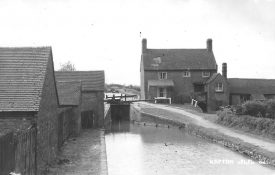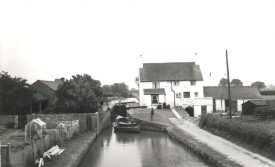The Cocks family led their life at Napton Locks as carpenters on the Oxford Canal for more than a hundred years. The story begins with Thomas Cock [the s was added later] who was born in Hillmorton near Rugby in 1796. Thomas and his family moved to Napton, probably in 1833, to take up the job of lock carpenter there. Some of the tools used on the locks are still held by the family including a trysquare on the handle of which is inscribed the name ‘Thomas Cock’. Thomas’s son Joseph succeeded his father as lock carpenter in 1865 and was, until 1899, a Congregationalist lay preacher before founding the Christadelphian meeting in Napton.
There is a letter, helf in our family for many years, from Brother Ladson of the Christadelphian community to his sister Fan, dated 24th May 1905 which gives a glimpse of the Napton scene of a hundred years ago. He had cycled from his home in Birmingham to speak at the Christadelphian meeting at Napton, and reported as follows:
passing through Radford and Southam, I came into the country of canals, and saw the bold outline of the great windmill that I remembered on my last visit. A few more hilly miles and I reached Napton, and was welcomed by bro. Cocks and his pretty little housekeeper who has been ill and is still weak.
The place is just the same, only that one of the cats is dead and the trees are all in leaf. It is one of the loveliest spots on earth, I feel sure. The may is out on the hedges, and the crab apples, also in the hedges. It looks lovely. The blossom is the same as ordinary apple bloom. I went to bed at ten, after a real cyclist’s tea and supper. They are both most kind.
The scene from my window next morning was beyond words. The hills and the canal and the masses of green leaves and the red houses and the blue sky and sheep and cattle and birds, all made up a scene of loveliest, softest and most peaceful beauty. I just kneeled at the window and let the beauty work into my soul. Truly, it is a beautiful world.
The name of the housekeeper referred to was Francis, who Joseph subsequently married.
Succession
It was Joseph’s younger son Sidney who succeeded his father as lock carpenter at Napton and he held the position until his retirement in 1938. This is where my own memory comes in as I just remember seeing Uncle Sidney, shortly after his retirement, on a family visit to Napton. My mother, who lived in Birmingham during her childhood, often mentioned the happy holidays she spent staying at the Locks during this period. She told me how they would enjoy playing hide and seek there. In the evenings the boat people passing through Napton would moor by the nearby bridge and entertain themselves with music from their concertina. She recalled an occasion during the First World War when they were driving along the road and met the authorities who took the horse off them for the war effort.
Outings in those days were a simple pleasure. The family took out a boat along the canal, accompanied by music from their gramophone. They had an organ which they placed on the ice boat and cruised along, hauled by their donkey, as they played and sang hymns.
A 106 year association
Sidney’s elder son Cyril was, for a period, the lock keeper at Napton, but Sidney’s retirement ended the 106 year association of the Cocks lock carpenters with Napton, even though the carpenter’s craft continued in the family.
This is an abridged extract from the book The Cocks of Napton Locks by Michael Caton. The book can be purchased here.



![Napton on the Hill. Chapel An unidentified chapel in Napton on the Hill. 1950s [This is the Christadelphian meeting room at the junction of New St. and Howcombe Lane.] | IMAGE LOCATION: (Warwickshire County Record Office)](https://d23iiv8m8qvdxi.cloudfront.net/wp-content/uploads/2016/11/6052-0-275x207.jpg)






Comments
Add a comment about this page